Markus Orths, Karlsruhe (D)
Markus Orths was born in Viersen in 1969 and lives in Karlsruhe. Orths was suggested as Daniela Strigl's competition sponsor.
Download text in:
Word file format (*.doc)
PDF file format (*.pdf)
Information on the author
Markus Orths wants to enter the competition without a video portrait.
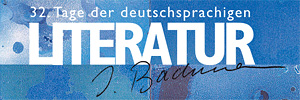
Markus Orths
The Chambermaid
(excerpt from a novel)
Her life is running as smooth as clockwork. Lynn has learnt to fold the bath towels into swans. With guests who stay longer there's sometimes even a tip. Lynn doesn't just clean, she cleans thoroughly. Where other chambermaids don't see anything else, that's where Lynn gets going. The faint mark on the little wooden table is from a tumbler, a mark that you can only see if you lean over and squint: Lynn takes the wood polish and wipes away the mark. Black grains in the cracks between the cushions of the window seat are barely visible ash: Lynn scrapes them out with a knife. A fingerprint on a tile at eye level: anyone else would have missed it. The chest of drawers: not a crumb left inside. Lynn has let her thumbnails grow so that she can remove the dirt that sticks to the fittings. The sheets lie on the bed as if freshly ironed, there is no lumpiness about the duvets, not even the smallest corner of a towel is poking out of the pile. Chairs are pushed in front of wardrobes, the tops of wardrobes are dusted, radiators, the corners of toilets, air freshener, a good airing, the smell of outside. Lynn pushes a wet cloth, that she has wrapped around the blade of a kitchen knife, into the tiny gap between the mirror and the wall, she cleans the lampshades inside and outside, moves the table and vacs the flat spots on the carpet.
Lynn returns to the rooms more and more often. Not to the rooms people are vacating, no, to the ones they are staying in, if she thinks that the guests are out, won't come back until night falls. And Lynn sniffs. How does the man smell who is staying here? Does he smell of lavender? Do his pyjamas stink of sweat? Which detergent was used on the clothes in his suitcase? Peach? Violet? The Scent of Spring? Does he shave dry or wet? What did he write on the slip of paper? Are his clothes tidy or hung over the back of a chair? What's in his pockets? Why is he here? A construction job? Business meetings? A private trip?
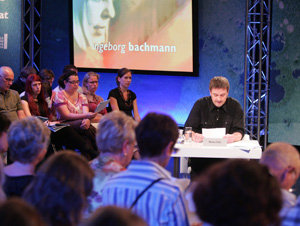
A woman in the next room. The shoes beside the chair are bloody high, whoever wears shoes like that must be self-confident, must be happy with herself, must find herself beautiful, whoever wears shoes like that must want to tower above the world, her tights show signs of discharge, in the bathroom Lynn finds the medicine, a little hidden, at the bottom of her toilet bag, Canesten, against fungi, a nametag is stuck to her suitcase, Sabrina Hutwelker, Sabrina, Lynn thinks, there is something Humphrey Bogart-ish about it.
Room 309, a Lidl bag on the chair, how can he afford a night in Eden, too expensive for him, probably his company paid for his stay, there are chips, peanuts, chocolate and a screw-top bottle of wine in the bag, the man is small, small and fat, an ointment, he must have fallen over, a graze, the rest of a plaster in the bin, or, Lynn thinks, he's been beaten up, given a thrashing, maybe he's someone people tease, make jokes about, and have since his schooldays, this fat boy with glasses, now he wears contact lenses, the empty lens case is open over there, always wearing thick glasses as a child, that distort his eyes, some easy reading on the bedside table, all dog-eared, found remaindered, for one euro fifty, and as if that were some immeasurable sum the man has scribbled the sad words onto the first page: This book belongs to Bernie Willms.
Lynn stays longer each day. She doesn't have anything else to do in the room she's standing in, long after noon, she finished work hours ago. If the guest has forgotten anything, or an appointment has been pushed back, and he appeared unexpectedly, then Lynn would be in a tight spot. She can't tell whether the excuse she has prepared would be believed. But that's the attraction: the fear of being caught. A travel hairdryer? The woman has never stayed in a hotel before, or she doesn't trust the hotel hairdryers. Slippers? A long stay. The minibar plundered? No self-control. No pyjamas in the bed? The guest slept naked, no, the pyjamas are in the wardrobe, he threw them in there. Lynn leaves the pyjamas where they are, she closes the wardrobe, tugs at the duvet, but can't get the pyjamas out of her head. She looks at the clock, opens the wardrobe, takes the pyjama top out, giving it a shake. It can be buttoned up like a shirt. Lynn lays it on her shoulders. Stands there a while. A sudden nervousness when she imagines the door is opening. She throws the top back into the wardrobe. And anyway, the pyjamas are pink, next to them yellow socks, for bed too? The woman is still a child: she wants to be put to bed. A little nightdress with straps? Who do you wear something like that for? The woman is here on her own, a single room, the bedclothes only rumpled on one side. Lynn quickly gets undressed, hurriedly, stands naked by the bed. She throws her cleaning clothes on the chair. She squeezes into the nightdress. It's too small, barely covering her privates. Then she hears voices at the door, tears the thing off, it doesn't rip, Lynn is breathing heavily, but the voices die away. Lynn puts her cleaner's uniform on again and makes the bed.
It happens one Tuesday.
Lynn has given each day a colour. Tuesdays are the colour of eggshell. That morning she had shelled an egg, but not eaten it. Now, standing in room 303, she hears steps in the hall, jumps with surprise, she had lost track of time, she looks at the clock, she's been off work for ages already, and Lynn already knows as she hears the steps that they are going to stop in front of the room she is standing in and shouldn't be standing in any more. Lynn is wearing the guest's pyjama top over her uniform. She has done the buttons up. The sleeves are much too long. She hears the key in the keyhole. The door opens, the guest enters his room.
And Lynn?
Has disappeared.
Her heart finally shows a sign of life.
She is lying under the bed.
It is a double-bed.
She is still wearing the pyjama top. Lynn rests one side of her head on the floor. She can see the man's legs as he goes into the bathroom. She hears the jet of water from the shower. This is her chance. She comes out of hiding. She looks towards the bathroom door, all clear, Lynn folds the pyjama top and shoves it under the duvet.
And now?
She only has to leave the room quietly. Then everything would be fine. She hesitates. She can still hear the shower.
Lynn doesn't open the door.
She stays.
She's playing.
She wants to.
Feels the itch of temptation on her skin. Still a little hesitation: What on earth am I doing? And then Lynn acts.
She crawls back under the bed.
Lies there.
Waits.
That's what life looks like.
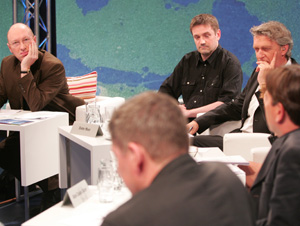
A few minutes are enough to reconnoitre her territory, to sniff around, to mark it. It is dark there and dusty, but it doesn't weigh oppressively on her. It would be as if she were lying in a coffin if it weren't for the open sides, but there are open sides, bringing light and air. There is more than a palm's width between the end of her nose and the bottom of the slatted bed frame. Lynn can grasp the frame of the bed with her hands. She can wrap her hands around her head. She can shove them under her hips. The slats, a shimmer on the mattresses, the frame, two frames, one for each mattress, each one 80 cm wide, 2 m long, and where the shoulders lie four of the braces bend downward a little, not too much, hardly enough to notice, the bed has four legs, no extra supports in the middle. Lynn folds her hands around the cross-braces level with her hips.
The man returns to the room. He turns the television on. The flick of a lighter, a long, relaxed exhalation of breath. First a film that Lynn doesn't know. She likes to make pictures from what she hears. Later a news channel. The quiet breathing of him sleeping from above, but he doesn't snore. How can he sleep with it on? Maybe the monotonous sound of the speaker? Now a voice that Lynn recognizes as the American president's. He says in English: When I talk about war, I am really talking about peace. After an hour the programme is repeated, almost the same news, an endless loop. Lynn starts to doze. In the end she falls into a deep sleep. At some point she wakes, the television has been turned off, her neck aches, but Lynn feels good there under the bed, she listens to the gentle breathing above her. In the morning she crawls out of her hiding place, when he's in the shower.
Wednesday is Lynn's day off. She leaves the hotel by the back entrance, without anyone seeing her. Her heart beats faster whenever she thinks about the night. When she thinks about what might have happened. When she thinks about what she might have overheard. When she thinks about the risk that she might have been found. A layer of tiredness covers her. Everything is oddly stuck together. But she knows that she will do it again, will have to, she knows that she has found something. Every Tuesday, Lynn says, I'll do it every Tuesday.
On Sunday she gets restless. She doesn't know if she can bear to wait until Tuesday. Two more nights in her own bed. Two more nights on her own. And just when she's thinking of crawling under the guest's bed in room 307 on Monday night, it's an old woman who has taken the room for a week and who curiously has false teeth that float in the bathroom cup like a forgotten smile, just then, as Lynn is wringing out her cloth and listening to it dripping quietly, Heinz comes into room 302, where she's cleaning.
‘Lynn,' he says.
Lynn stands up and looks at him.
‘There's a call for you,' Heinz says.
‘Who is it?'
‘Your mum.'
Lynn takes off her uniform. She does it without thinking. Sunday is pale blue, Lynn takes a taxi to the train station, for the train home, four hours' journey, at the other end she takes a taxi to the hospital, where she hesitates, lights up, trying to keep the smoke near her, stubs out the cigarette in the ashtray provided. Next to her a man with a thick bandage around his head is puffing away, he smiles. She finds out which room at reception: 118. One plus one is two, two plus two is four, four plus four is eight. Her mother is awake. Her first words aim to reassure her. Nothing bad, her mother says, got to the hospital in time, luckily, the operation successful, a bypass, will be at home in two or three weeks' time, change of lifestyle, less fat and all that, but nice to see you, Linda. Lynn draws a chair up to the bed. It makes a sound that gives you goose bumps. A second woman is lying in another bed, sleeping, a pile of mags next to her bed.
‘How did it happen?' Lynn asks.
‘When I was mowing the lawn. But everything is fine, the bypass is fine, the operation went smoothly. By the way, you write ‘bypass' with a y. I always thought you wrote it ‘bi', but you write it with a y.'
Lynn takes her cigarettes from her bag, looks around and decides against it, puts them away again.
‘How long have you been back?' her mother asks.
‘For three months.'
‘You could have visited.'
‘Of course,' says Lynn.
‘Have I done something wrong?'
‘Mum,' says Lynn and gives her a look that stops her from saying anything.
I can barely carry myself, Lynn would have liked to say, so how should I carry you, when I can barely carry myself? But she doesn't say that. She doesn't say anything. There's no room for you on my shoulder any more, Lynn would have liked to have said, there's barely room for me up there, I drag myself along as best I can. If I had to shoulder you too, I'd collapse.
‘It's good you're here,' her mother says.
‘I can't stay long.'
‘Of course not.'
She doesn't let it show, thinks Lynn. She has pulled herself together, snapped out of it. How can you snap out of it, thinks Lynn and looks past her mother. Snapping is always a breaking, always destructive. Every day we have to pull ourselves together, snap out of it. Every day we do something impossible. We live in a space of simultaneous contradictions.
‘Can you pour me a glass of water?'
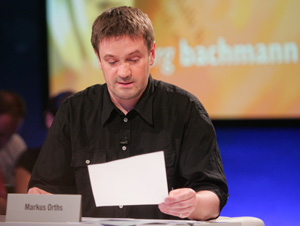
Lynn pours the water, not many bubbles, the woman in the next bed wakes up, gives a grunt just before waking up, jumps a little with surprise, greets the visitor, Lynn nods, her mother ignores the woman, carries on talking to Lynn, talking about the flowers that she has planted, about the weeds she's pulled up, about the figures she's made, about her plans. This autumn she's going to Tuscany on a coach trip.
‘That's great,' Lynn says.
‘Do you have change?'
‘Why?'
‘There are vending machines outside.'
Lynn shakes the contents of her purse out onto the table.
‘How's work?'
‘I'm doing cleaning.'
‘What do you clean first?'
‘The bathroom.'
‘Always?'
‘First the bathroom, then the bedroom. I vac the floors.'
‘Do you dust?'
‘Every day.'
‘Does dust even settle after just a day?'
‘You can barely see it. Just in the sun.'
‘But you still dust?'
‘Yes, of course.'
‘With a duster?'
‘With a wet cloth.'
‘And the beds?'
‘I do them too.'
‘Do you change the sheet every day?'
‘Depends.'
‘On what?'
‘On how long the guests stay. If they only stay for a day, I have to change the sheets every day.'
‘And if they stay longer?'
‘Then I don't.'
‘If someone stays for three days?'
‘Then I don't.'
‘If someone stays for a week?'
‘Then after the third day.'
‘Every three days?'
‘Yes.'
‘So, if someone stays for two weeks, you change the sheets four times?'
‘And again at the end. For the new guest.'
‘And their shoes?'
‘I have to clean them.'
‘Always?'
‘If the guest has put them out.'
‘What about the towels?'
‘They get changed.'
‘Every day?'
‘Depends.'
‘On what?'
‘Whether they're lying on the floor or hanging from the rack.'
Her mother was silent. Exhaustion on both sides. Like after a fight. We haven't talked this long for ages, thinks Lynn.
‘And apart from that?' asks Lynn after a while.
‘I've been crocheting,' says mother.
‘What?'
‘A windmill pattern. A doily with a windmill pattern. Four sails. The door. Two windows.'
‘Who for?'
‘For Frau Klöppels.'
‘For her birthday?'
‘She'll be ninety this year.'
Lynn takes a sip from mother's glass.
‘I have to go now,' she says later, sometime. ‘My train.'
‘Are you coming back?' mother asks.
‘It's a long way.'
You get kids, Lynn thinks, you raise them, feed them well, take care of their day-to-day survival, you let them slip out of the house, out of your hands, into the world, and then they live in the world, with others, and you want to be near them and can't be, you squeeze a few words out of them, nothing more, then they disappear. Lynn gets up. She doesn't know how to say goodbye. Her mother reaches out for her hand, brings Lynn's hand to her face like a dishcloth, as if she wanted to wash her face with it. Lynn lets her. Lynn can't see herself, from the outside, there is no mirror in the room, and she doesn't know if her mouth has constructed a smile or is just staying straight, an expressionless, horizontal, thin line in the landscape that she has called her face since she learnt to speak, but which she's never faced, except in the mirror, and then she's no longer herself.
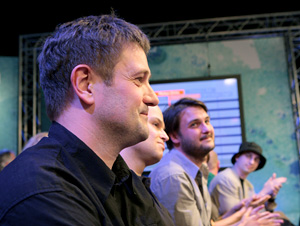
When she's closed the door and left her mother behind and the hospital is disappearing behind her, she fishes for her cigarettes, but what she pulls out of her pocket aren't cigarettes, it's a little box with blue and white pills in three compartments, morning, lunchtime, evening. Lynn doesn't know how the box ended up in her jacket pocket, she doesn't know when she took it off the table, she only sees the result of her action, and because she doesn't know what to do she opens the box and swallows a white pill from the evening compartment, because it is well into evening now, and darkness is falling on the world, thinks Lynn, if it is possible that something can slowly fall on something, but there is no other word to describe what she feels.
The cleaning drags on Monday. Lynn dawdles. She should hurry up. Instead of cleaning more quickly, she is cleaning more slowly. She rinses the bathroom cups twice. One falls to the floor, tinkling in a thousand pieces, she has to sweep up the shards and fetch another one. Lynn sees invisible stains on all the bathroom floors. She can't mop enough. The tiles, Lynn thinks, really should be knocked out of the floor, to clean underneath, everything should be knocked out and redone, then it would be clean, but maybe it wouldn't, maybe then it would be dirtier than ever, from the dust the builders make. Wearing cleaning gloves, Lynn runs her hands round deep under the edge of the toilet bowl, there are spots there that she can't see, and spots she can't see have always disturbed her, how can I know that the spots I can't see are really clean, maybe I should get hold of a dentist's mirror so that I can see the inside edges too, a toilet-edge mirror, to find the smallest remaining bits of faeces and the splashes of urine, but what about the bacteria, you can't see the bacteria, you can only try to get rid of them with the toilet cleaners, you have to believe the labels on the cleaners, eradicates bacteria and cleans completely, accompanied by a picture of a boy kneeling by the toilet and whose teeth are as shiny as the white enamel bowl.
At six, Tuesday evening, Lynn squeezes under the bed and starts to wait. Room 308. The couple returns late. They talk until one. They don't argue, it's a conversation about the future, a conversation in which the word when plays a role, it's about a house they could buy, it's about the time they plan to spend together, it's about ‘living together', once we're living together, then we'll, says the man, and the woman is probably smiling, it's about a child who they don't yet have, it's about a life that hasn't yet been lived, it's the future's one-way street that spreads out on the bed in the darkness, the two of them have turned off the light, there is no sex up there, it's about money, financing it, a loan, about sums of money that the parents will chip in with, about estate agents and extortionate commission, and Lynn wonders whether the two of them are lying in each other's arms, at least, or each one separately and just looking at each other, without touching. The conversation falters, neither of them knows what to say any more, the future lies in their mouths like old chewing gum that has lost its flavour, and into this silence the man suddenly says, Mimimimi, and the woman gives a short laugh, the man speaking in a falsetto says, Mimimimi, I'm the Danish chef, he says, no, says the woman, that's the chef's kitchen boy, Smörrebröd, smörrebröd, ramtamtamtam, he sings, and the woman says, no, please, but the man tickles her anyway, and the woman laughs and says, no, stop it, else I'll scream, and the man stops and says Mimimimi again, the woman says, maybe we should try to get to sleep, and then it goes silent, just one more quiet giggle, and the woman whispers, good night, darling, till tomorrow, the man says and Lynn listens as they quietly turn away from each other, the bed creaking.
From now on, every Tuesday. Lynn takes a cloth with her under the beds and cleans the frames' slats. Never have the undersides of the beds been as clean. Lynn lies there on her own for the first few hours. Then she listens to what is going on inside her. But she doesn't hear anything, just her pulse, sometimes.
Lynn feels herself emptying of everything. With her eyes closed, she dozes off. When the door finally opens and someone steps into the room she starts, comes around, puts her hands on her stomach. Then she's awake. Then she's there.
On the third Tuesday there is a rustling of papers, a ping, like an email being sent, and a ping, like an email arriving. In between the man talks to himself now and then. Not with me you don't, he says, not with me. When his mobile rings, Lynn hears half of the conversation, for the most part it is numbers, maybe stock market prices, maybe case numbers, at one point the man just says twenty-four in answer to a question, twenty-four, he says, then a pause, then 311, that could be the room number but it could also mean anything else, then says the word ‘compliantly', just that one word, and Lynn doesn't really know what the word means, compliantly, or what question this word could be an answer to, the man's feet are bare, his calves prickly, one time he stands on one leg and scratches his left calf with his right instep, the ball of his foot is covered with yellow, hard skin, and once his foot is on the ground again Lynn sees an ingrown toenail. The man hangs up and says, Herbert, Herbert. He says, well done, Herbert. Lynn doesn't know if he's referring to himself or someone else. She hears a hissing sound, a glugging, then the man says the word ‘Katarupp', a word whose meaning is a mystery to Lynn, Katarupp, he says again and sits down on the bed, the skin on his heels is thin and red, so different to the balls of his feet. A bottle cap falls onto the carpet by the bed, the man reaches down, picks it up, he's wearing a ring on every finger of his hand, even on his thumb. For a moment it flashes through Lynn's mind to grab the man's hand in a surprise attack, just to hear his horrified scream, but she quickly turns away, looking up at the bed frame, calming herself down, breathing slowly, breathing silently.

Television, on the fourth Tuesday, Lynn can't see the film, only listen. She imagines the images, listens to the voices and sounds and sees what she wants to, makes up her own images, whether they fit the film or not. The unambiguity of the words does limit her, though. When there are steps, or a door bangs shut, when there is a scream or an engine is started, or a kiss, or someone is hit, or panting or running away, then Lynn thinks, I don't want to hear that much. She likes the silence most. In the silence everything is possible. When the television goes quiet, when the film is silent, when the room is only full of images, images that she can't see, then it seems to her as if she had fallen out of time for a moment, as if she were no longer just herself. These moments are rare. But they envelope Lynn like warm towels.
Thursday, the call to her mother, a ritual.
Lynn is standing there with the receiver in her hand. She hasn't dialled yet. The telephone ‘seashell', Lynn says in the empty room. Why do we call the receiver a ‘seashell' in German, wonders Lynn. As a girl she had once found a shell on a beach, had brought the shell to her mother who was lying there in her bathing costume, white as chalk under a sunshade, with a book.
A shell, Lynn said, I've found a shell.
Her mother said, you have to put it to your ear.
And Lynn held the shell to her ear.
What can you hear? her mother asked her.
A roar, Lynn said.
That's the roar of the sea, her mother said, of the waves that are trapped in the shell.
The sea? Lynn asked.
The sea, her mother said and carried on reading.
How, thought Lynn, can a shell trap the sea, how can something as small and fragile as a shell catch something as big and indestructible as the sea, the waves of the sea, the roar of the sea? Later she took the shell to her room and put it on the bedside table, and because she couldn't sleep she had put her ear to the shell again and again, had stared into the darkness and listened to the sound of the waves. She had lifted the tumbler and drunk all the water in the glass, and only because she had lifted the tumbler and drunk all the water in the glass, was she able to hold the empty glass in her hand, and only because was holding the empty glass in her hand had she suddenly covered her ear with it, and only because she had covered her ear with it, did she hear the same roar that she had heard in the shell, the same waves, the same wind. And Lynn put the glass back and threw the shell into the bin, because she had a sudden feeling that everything in life was a sham.
Translated by Stefan Tobler

